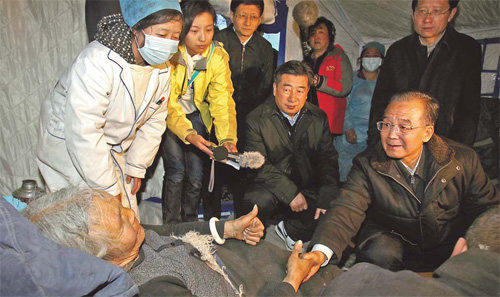-
-
China Daily E-paper
From Chinese Press
Underlying predicament behind disasters
(chinadaily.com.cn)
Updated: 2010-04-16 16:39
 |
Large Medium Small |

Premier Wen Jiabao, who visited Yushu Prefecture Hospital in Qinghai province on Thursday, holds the hand of a Tibetan woman injured in the quake. Vice- Premier Hui Liangyu (center) accompanied Wen on the trip. [Xinhua]
The death toll of Yushu earthquake has climbed to 791. It is time for us to reinforce the poor infrastructure of the remote areas while we are making efforts to save lives, says an article from the China Youth Daily. Excerpts:
Disasters have no mercy, but humans do. When a sudden disaster strikes, we the Chinese make national efforts to minimize the loss and save the most lives.
Every disaster brings misfortune to the innocent folks, but it also brings us together. We grow up after each disaster, having a deeper understanding of life's preciousness, feeling much awe about the universe and cherishing more Nature's gifts.
Every disaster, from the Wenchuan earthquake to the southwest drought and then to the Yushu earthquake, even the Shanxi coal mine tragedy, diverts our attention to the afflicted land. In addition to the disaster itself, what makes people worry is the predicament behind it.
| ||||
In fact, we have witnessed the same plight from the southwest drought. The drought has highlighted the lack of irrigation facilities. "We need funds, technical support, professionals," as posted by a female college graduate village official.
Every disaster has prompted us to shed tears for the predicament in remote villages. It not only involves scarcity of materials, but also the lack of grass-roots governance. Even during the reconstruction in the earthquake-hit area, there came absurd news of local government officials purchasing luxury cars, spending huge sums on an earthquake museum and building villa-style model houses.
The first priority now is making every effort to save lives. But examining the predicament behind the disaster won't affect our commitment.
We should consider how to reinforce the local infrastructure, including houses, electricity, communications, water, and medical care. Possessed with such super disaster relief capabilities, we should build up stronger programs for disaster prevention, mitigation and resistance like Japan, Chile and other countries.
The more ecologically fragile the areas are, the more prone to various types of disasters they would be. Thus, more resources should be injected into the remote areas to establish their ability to protect themselves. So when disaster comes, we can be more calm than sorrowful.













